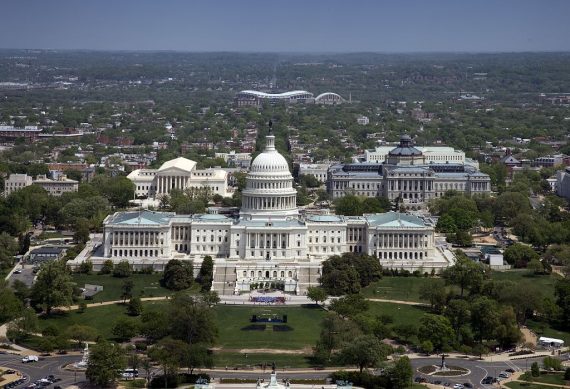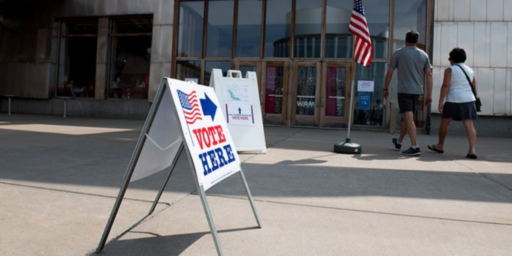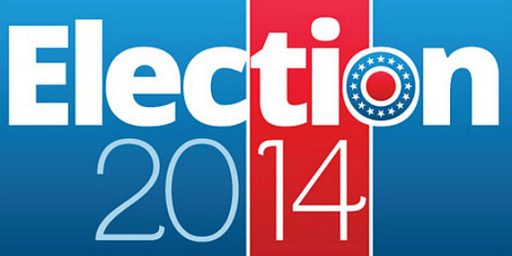48% Of Americans Don’t Care Who Controls Congress
Public cynicism about politics at its very best.
According to a new poll, nearly half of all Americans don’t care who ends up controlling Congress after the 2014 midterms:
WASHINGTON (AP) — Who cares which party controls Congress? Only about half of Americans. The other 46 percent, not so much, according to an Associated Press-GfK poll.
Ask people whom they would rather see in charge on Capitol Hill, and Republicans finish in a dead heat with “doesn’t matter.”
Democrats fare only a little better: 37 percent would prefer their leadership, compared with 31 percent each for the GOP and whatever.
“I’ve never really noticed any difference in my life depending on which party is in,” said Bob Augusto, 39, an oil refinery worker in Woodstown, New Jersey. He doesn’t expect to vote in this fall’s midterm election.
Nationally, Democrats have gained a modest edge since the previous AP-GfK poll in March, but it’s not because people are liking them more. Support for Democratic leadership stayed essentially unchanged in the new poll, while Republicans lost some ground to the idea that it makes no difference who wins this November.
“I think that in general people who are in Congress and people who have enough money to run for Congress are only in it for themselves,” said Jill Narushof, 52, a mother of two and part-time math tutor in Albuquerque, New Mexico, who says she’ll vote but hasn’t decided for whom. “I don’t see very many who are really interested in serving.”
Parts of the poll bode well for the GOP.
Republicans, whose party has successfully deployed its House majority to block President Barack Obama’s policies, are significantly more likely than either Democrats or independents to value control of Congress. And their base is more excited, too: Conservative Republicans are more concerned about party control than liberal Democrats are.
With Republicans making a strong push to seize control of the Senate, only a slim majority of Americans, 53 percent, say they care a good deal about which party wins.
A vast majority appear united around one thing: They’re fed up. Nearly 9 out of 10 disapprove of Congress. Two-thirds want their current representative voted out, the AP-GfK poll shows.
And most — 56 percent — disapprove of the way Obama is doing his job.
Still, history suggests most people won’t go to the polls to decide who runs Congress during the last two years of a presidency marked by remarkably bitter standoffs between the two political parties. Midterm elections usually draw about 40 percent of eligible voters.
Most incumbents won’t face a serious threat for re-election. The Republican Party is widely expected to keep control of the House. A handful of hot races are likely to determine whether Republicans take the Senate away from Obama’s party.
This is hardly surprising, of course.
Voter turnout for non-Presidential elections is traditionally low, and this is as much true for midterm elections where control of Congress is up for grabs as it is for off year elections where generally only state and local offices are on the ballot. Traditionally, this lower turnout in midterm elections has tended to help Republicans, but its worth noting that it was in off year elections in years like 1986 and 2006 that the GOP lost control of one or both Houses of Congress, so that isn’t always true. What this ends up meaning, of course, is that control of Congress often ends up being decided on the margins in particular states and Congressional Districts, and it often depends on which candidates was best able to get their base to the polls on Election Day. Of course, this is a large part of what leads to the sharp ideological divisions that we know have in Congress that are a huge contributor to the gridlock and pointless partisan battles that have become par for the course over the past several decades.
Added into the generally low turnout for midterms, of course, is the fact that the American people generally have a very low opinion of Congress. Some recent polling has put Congressional job approval as low as nine percent While one might think that this would lead people to vote against incumbents, the fact that incumbents continue to get re-elected in vast numbers seems to provide evidence for the “everyone hates Congress, but loves their Congressman” hypothesis. While there may be some truth to that, I’d suggest that what low public opinion of Congress really leads to is the kind of cyncism that just causes people to tune politics out and, of course, not show up on Election Day. Quite honestly, I can’t say that I blame them.






The headline should have been “46% of americans don’t understand the current political situation”
Alternative headline: “48% of Americans think their vote doesn’t matter.”
This 48% represents either: (1) a kind of measure of our low Information voters, or (2) the number of people who don’t want to tell a pollster the truth about their political preferences. Perhaps there’s some of both at play here.
I suspect that this 48% “Don’t Care” cohort is greatly overstated, because it it is completely at odds with the polarization we have in Washington and in state houses across the country. Of course people care, the stakes are high. Republicans have endeavored at least 50 times to repeal a health care law that is succeeding.
In a similar vein I read a discouraging statistic about my home state of Illinois this morning. Here 80% of state legislators run unopposed.
“Nearly 9 out of 10 disapprove of Congress.”
“Republicans…..are significantly more likely than either Democrats or independents to value control of Congress. And their base is more excited, too.”
It seems the latter explains the former……
@al-Ameda:
Disagree. Because almost half don’t care and don’t bother voting (most of which are moderates), you’re left with mainly polarized voters, which creates what you see.
I’m not sure I agree that these people are low information either; I know at least one poly-science prof who follows politics (Canadian version) who claims he’s spoiled every one of his ballots in the last two decades … the best he could come to “none of the above”.
In fact, I bet if “none of the above” was an option, it’d be higher than “don’t care”.
That’s depressing. I have a lot more respect when persons embrace one party philosophy and support that party. That shows a level of engagement in caring about things around them.
Turnout in the 2012 presidential was roughly 58% of the voting-eligible, so if these numbers are at all comparable (and they are not), 6% of the apathetic are just cultural voters and don’t really believe in voting.
From the quotes it sounds more like they don’t think it matters more than that they don’t care.
With the current state of non compromise in congress I am not sure it matters a great deal either-congress is broken and the GOP winning the senate (which I think is unlikely but I do think they will pick up a few seats) isn’t going to change anything.
Personally what might help the most would be for a leadership change-no more Reid, McConnell and Boehner or Pelosi. But that likely won’t happen either.
Put me down in the 48%. Government requires mostly only competent administration, and much of that can be given to computers. And it will be when those raised in the info age get the reigns of power.
Meanwhile, VA claims are still processed on paper. They take pictures of paper claims and call them “electronic.” No sale.
This is directly online with what I said a couple years ago, and in various forms since.
That 48% does in fact care, but knows they can’t make any difference voting what what the Democrats or the GOP offer up. The last time the voters came out of the woodwork, with people voting for the first time in years, and often for the first time in their lives was Reagans two landslides. The GOP steadfastly refuses that crucial lesson, opting instead for liberal lite.
@Eric Florack:
Um, a quick Google shows that the last three elections have had a higher voter turnout than any election since 1968 … not what your theory predicts. In particular, 1980 and 1984 (Reagan’s years) had 52.8% and 53.3% – both less than Carter’s 53.6% so hardly unprecedented.
I think that the voters are like the children in a dysfunctional marriage. There is so much yelling and screaming about everything. All disputes are turned up to eleven. In that kind of a household, the kids keep their heads down; in that type of politics, voters are turned off.
The political parties must think that they derive benefit from this situation causing them to perpetuate it at every turn.
I think we should all refuse to identify with the parties. We should take the attitude that the parties are there to serve us, not that we are committed to one or the other. In the PC/Mac wars I have taken the stance that I’ll study my needs and go with the best way of meeting that need. We need to make the politicians aware that they need to serve us, and voting out a few incumbents could be a good start.
As individuals, we should turn down our tone as well. This site is pretty good, but my home newspaper comments are a museum of invective. Even the obituaries of public figures are full of comment that are scurrilous; folks the guy you hate is dead, let him be forgotten if you hate him.
@george: a higher voter turnout, or a higher percentage?
The former I can believe. The latter?
@Eric Florack:
According to the Wiki page, both.
1976: 53.6%
1980: 52.8%
1984: 53.3%
2004: 55.7%
2008: 57.1%
2012: 57.5% on wiki page, (that last number though is unofficial, and doesn’t make sense given the numbers unless the number of registered voters declined significantly).
In any case, Reagan didn’t seem to bring out an unprecedented number of voters, and the 2nd election of Bush Jr and first of Obama both brought out a bigger percentage.
truly sad commentary on the voting populace, as much as i may agree/disagree with y’all in here at least you do care to some extent. i’d hate to think either party wants the rest to just be too busy/disgusted/apathetic/ignorant to even care about it. but i could be wrong.